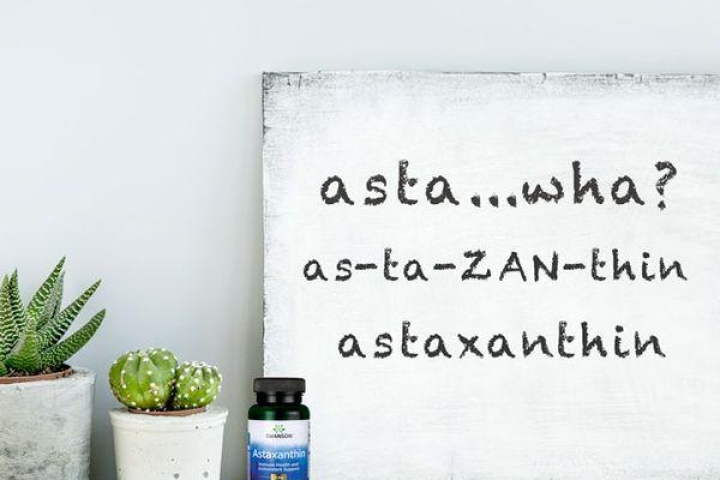Lutein and Zeaxanthin Benefits to Help Protect Your Eyes and Skin
Nutrition is an essential part of keeping us healthy long-term, and our eyes and skin are no exception. More than 6.5 million Americans over 65 have eye health concerns, and our population is aging—by 2030, an estimated 71.5 million people will be over age 65.1 That means there’s a greater chance of even more people having concerns with eye health in the future.1 In addition, in 2017 the American Academy of Dermatology reported that 1 in 4 people experience skin health concerns each year.2
All of this adds up to an important truth—we should do everything we can to support our health and make sure we get enough of the nutrients that support specific areas of health, including antioxidant carotenoids like lutein and zeaxanthin for eye and skin support.
What are Lutein & Zeaxanthin?
Lutein and zeaxanthin are nutrients that are classified as carotenoid pigments. You may be familiar with other carotenoids, like vitamin A (beta-carotene) found in orange produce like carrots, or lycopene found in red produce like tomatoes, watermelon and red peppers. Carotenoids are the pigments that give our produce color, and over 600 carotenoids have been identified in nature.3
Each carotenoid provides unique benefits, and some of them have an affinity for certain areas of the body.3 Lutein and zeaxanthin are particularly beneficial for eye and skin health.3 Carotenoid nutrients are a big part of why we should aim to eat a variety of colorful produce. Diversifying our intake of real foods gives us nutritional diversity, an important factor in maintaining health and wellbeing.
Lutein and zeaxanthin are also known as macular pigments.3 They are helpful carotenoid pigments that are highly concentrated in the macula, and lutein is also deposited in the skin.3 These two macular carotenoids are very similar in structure and benefit. You’ll often find lutein and zeaxanthin together in the same foods, and they’re also available together in lutein and zeaxanthin tablets and softgels.
How Do Lutein and Zeaxanthin Work?
The vision benefits of these carotenoids result primarily from their ability to help filter harmful blue light, and they provide antioxidant benefits as well. Why is filtering out blue light so important? Blue light rays are shorter and more energetic than any other type of light on the visible color spectrum, so blue light rays are more damaging to our retinas.4
Blue light is very close to ultraviolet (UV) light, which is not visible to the human eye. Like UV light, blue light comes naturally from the sun. Electronic devices are also a major source of blue light exposure for most of us. More blue light is emitted from smartphones, tablets, computers, televisions and other electronics than from any other light source, and since the average American adult spends more than 11 hours per day on electronic devices, our exposure levels have increased exponentially compared to previous generations.5,6
Lutein supports skin health in a similar way and in part by providing antioxidant support for healthy skin cells to fight oxidative damage, which is a key contributor to many skin health concerns, including signs of skin aging.3,7
Benefits of Lutein and Zeaxanthin
Lutein and zeaxanthin are widely known as “eye vitamins” as the primary area of research for these ingredients has been around eye health. People who consume higher amounts of lutein and zeaxanthin on a regular basis have fewer eye health concerns, including age-related eye concerns.8 But the antioxidant effects of lutein may extend to many other areas as well, including health and appearance of the skin.7
Lutein and zeaxanthin are both strong antioxidants that show beneficial effects against oxidative stress from daily functions and environmental concerns.9 They are free radical-scavenging nutrients, and since free radical damage is a major contributor to signs of skin aging and skin health, protecting against free radicals may help keep skin healthy and vibrant.10
Also, an exciting new study linked higher lutein levels with a higher IQ, noting that about 60% of the total carotenoids in brain tissue is lutein.11 So, getting your daily dose of lutein may even help make you smarter!11
Lutein and Zeaxanthin for Eye Health
We are bombarded with blue light every day—from our digital device screens and the natural light coming through our windows to the light from energy efficient light bulbs. Taking lutein and zeaxanthin supplements is an extremely beneficial way to help keep our eyes healthy in the face of so much blue light exposure.
As previously mentioned, the visual benefits of lutein and zeaxanthin are believed to be tied to their ability to help filter out those damaging blue light rays before they can cause damage.12 When we consume them, they accumulate in the macula, which is the region of the retina responsible for vision.9,13 The macula is also the area of the eye that is most sensitive to blue light exposure.12
You may think of it as similar to sunglasses or window tinting, but we recommend you continue to wear your sunglasses because they are your first line of defense while you are outdoors against blue light from the sun and UV damage to your eyes.12
In addition to their benefits against blue light exposure, lutein and zeaxanthin have shown a lot of promise in helping protect our eyes against age-related health concerns, which is demonstrated by fewer occurrences of eye problems among those who consume higher amounts of foods that contain these macular carotenoids.8 Lutein has also been linked to night vision benefits, as one study linked lutein to better visual performance at night.13 Individuals taking lutein supplements for a period of 36 months have also reported improvements in existing symptoms related to eye health, but we recommend starting your eye health support regimen as early as possible to stay ahead of potential eye problems before they start.8
Lutein and Zeaxanthin for Skin Health
When it comes to keeping our skin healthy, there’s a lot working against us, but we can help stack the odds in our favor with the right care and nutrition. Just as our eyes are bombarded with blue light, our skin is constantly exposed to the elements—polluted air, solar radiation and plenty of chemicals in our environments and household products may encourage free radicals and skin damage.10 Psychological and physical stressors also play a role, including nutritional gaps or overeating, alcohol intake, plus our own natural metabolism generates free radicals that can affect the health and appearance of our skin.10
Lutein and zeaxanthin are a big step in the right direction when it comes to skin health. They are strong antioxidants, helping to fight off damage from oxidative and environmental stressors.10 Carotenoids are known to accumulate in the dermis and help play a role in skin protection. Though lutein is often found in much lower levels in the skin than some other carotenoids, they each play important roles and contribute to a larger nutritional effort to keep skin healthy.14
Lutein and Zeaxanthin Dosage: How Much Lutein and Zeaxanthin Do I Need?
According to the American Optometric Association, most Western diets are low in both lutein and zeaxanthin, and the association recommends supplementing your diet with at least 10 mg per day of lutein and 2 mg per day of zeaxanthin to support eye health if your diet is low in these nutrients.15
Doses of 6.9 mg to 20 mg of lutein per day has been studied in scientific research, and doses of up to 15 mg per day have been used safely for up to 2 years.16 Due to variations in product formulations, always follow the directions on your product label to determine how much lutein and zeaxanthin to take.
Just for comparison, a cup of raw kale (one of the richest food sources of lutein and zeaxanthin) contains 22 mg of lutein and zeaxanthin, so the kale-enthusiasts among us are benefiting from added macular carotenoids.16 You can check your own daily intake by reviewing the list of lutein and zeaxanthin food sources below.
How Can I Get Lutein and Zeaxanthin?
The best way to get lutein and zeaxanthin in your diet is by eating real foods that contain them, which include many dark, leafy greens. Kale contains a higher amount of lutein and zeaxanthin, while romaine, whole eggs and corn contain smaller amounts.
Since eating a bunch of kale every single day isn’t in the stars for all of us, we can help meet our nutritional need for lutein and zeaxanthin with supplements, like Naturespan Ultra Synergistic Eye Formula with Lutein and Zeaxanthin, which includes 20 mg of lutein sourced from marigold flower extract plus 2 mg of zeaxanthin from paprika fruit. It’s a simple and cost-effective way to make sure you get your daily dose of lutein. We also offer individual supplements of 40 mg lutein or 4 mg zeaxanthin if you are looking for a higher daily dose of either nutrient.
Food Sources of Lutein and Zeaxanthin
Which foods are high in lutein and zeaxanthin? Here’s a list of selected foods that contain lutein and zeaxanthin.17
- Kale (22 mg per 1 cup raw, 44 mg per 1 cup cooked)
- Spinach (6.7 mg per 1 cup raw, 15 mg per 1 cup cooked)
- Turnip greens (9 mg per ½ cup cooked)
- Collard greens (8.7 mg per ½ cup cooked)
- Broccoli (3.3 mg per 1 cup cooked)
- Corn (1.5 mg per ½ cup cooked)
- Romaine lettuce (1.47 mg per 1 cup raw)
- Green peas (1.1 mg per ½ cup)
- Brussels sprouts (1 mg in ½ cup cooked)
- Eggs (0.3 mg in 2 whole eggs)
Lutein and Zeaxanthin Supplements
Help protect yourself from blue light and free radical damage with supplements formulated specifically for eye and skin health. You can choose a supplement with only lutein, or opt for a supplement that contains both lutein and zeaxanthin for multifaceted protection.
Naturespan Ultra Vision Defense
This exciting new formula features Lutemax® 2020 and an innovative new antioxidant blend including TrueBroc® broccoli extract, Mirtoselect® bilberry extract and AstaPure® astaxanthin to boost the effects of lutein. This breakthrough formula delivers a plethora of nutrients and antioxidants that support healthy retinas so your eyes can stay comfortable and focused today and each day moving forward.
Naturespan Ultra Lutein 20 mg
Promotes healthy eyes and skin and helps fight eye fatigue and strain with 20 mg of lutein sourced from marigold flowers. This is a great option for flexible lutein dosage when you already get some lutein in your diet from natural sources but want to supplement your intake to fill in nutritional gaps. This formula is also available in 40 mg lutein softgels if you prefer a higher dose.
Naturespan Ultra Zeaxanthin 4 mg
Fortify your free radical defenses for your eyes and other vital organs with Zeaxanthin.* A member of the carotenoid family, Zeaxanthin is a powerful antioxidant with specific benefits for eye tissues.* In fact, Zeaxanthin and lutein are the most prevalent carotenoids in the retina and macula of the eye. In addition to its specific role in eye health, zeaxanthin provides valuable protection for the whole body.*
You can see Naturespan’s full range of supplements for vision health here.
Carotenoids for Vision and Skin Support
The importance of nutrition for healthy eyes and skin shouldn’t be underestimated. Nutrition for these areas are a long game. So, start taking care of your eye and skin health now so you can get ahead of potential age and lifestyle-related concerns and support your long-term health and wellbeing.
Learn more about how blue light and our nutritional choices affect eye health by reading Important Facts about Blue Light and Eye Health, and Build Xtraordinary Eyes: Nutrition for Eye Health.
About Amy Sunderman, MS, RDDirector of Science & Innovation, Registered Dietitian, Naturespan Health
Amy is a registered dietitian, nutritionist and author with over 17 years of experience in the supplement industry. Amy is passionate about dietary supplements and the health benefits they offer. She enjoys working to find novel nutritional ingredients with strong clinical research behind them to drive innovation and provide health-promoting products to consumers.
Sources
1 Aging and Vision Loss Fact Sheet. American Foundation for the Blind. http://www.afb.org/section.aspx?SectionID=68&TopicID=320&DocumentID=3374&rewrite=0 (Accessed 05/15/2018)
2 New study shows significant economic burden of skin disease in the United States. American Academy of Dermatology. https://www.aad.orghttps://www.swansonvitamins.com/media/news-releases/burden-of-skin-disease (Accessed 05/15/2018)
3 Promoting Eye and Skin Health Through Intake of the Natural Carotenoid Lutein. Springer Link. https://link.springer.com/chapter/10.1007%2F978-1-59745-330-1_23 (Accessed 05/15/2018)
4 Dr. Vijaya Juturu on Blue Light and Lutein: Naturespan Health Products Facebook Live Video. https://www.facebook.com/NaturespanVitamins/videos/10155698267084336/ (10/23/2017)
5 Blue Light Can Affect Your Sleep Cycle: Vision Service Plan VSPBlog.https://vspblog.com/what-happened-to-sleep/ (Accessed 11/06/2017)
6 Americans Use Electronic Media 11+ Hours A Day: Nielsen, via Statista. https://www.statista.com/chart/1971/electronic-media-use/ (Accessed 11/06/2017)
7 The Role of Phytonutrients in Skin Health. US National Library of Medicine. https://www.ncbi.nlm.nih.gov/pmc/articles/PMC3257702/ (Accessed 05/15/2018)
8 Lutein. Medline Plus. https://medlineplus.gov/druginfo/natural/754.html (Accessed 05/15/2018)
9 The Photobiology of Lutein and Zeaxanthin in the Eye. US National Library of Medicine. https://www.ncbi.nlm.nih.gov/pmc/articles/PMC4698938/ (Accessed 05/31/2018)
10 Free Radicals and Extrinsic Skin Aging. US National Library of Medicine. https://www.ncbi.nlm.nih.gov/pmc/articles/PMC3299230/ (Accessed 05/15/2018)
11 Study links lutein levels to higher IQ. Nutra Ingredients. https://www.nutraingredients-usa.com/Article/2018/03/30/Study-links-lutein-levels-to-higher-IQ (Accessed 05/16/2018)
12 Eye Vitamins. Bausch + Lomb. http://www.bausch.com/reference/lutein-for-eyes (Accessed 05/15/2018)
13 Lutein supplementation improves visual performance in Chinese drivers: 1-year randomized, double-blind, placebo-controlled study. PubMed. https://www.ncbi.nlm.nih.gov/pubmed/23360692 (Accessed 05/15/2018)
14 Significant correlations of dermal total carotenoids and dermal lycopene with their respective plasma levels in healthy adults. US National Library of Medicine. https://www.ncbi.nlm.nih.gov/pmc/articles/PMC2957565/ (Accessed 05/15/2018)
15 Lutein & Zeaxanthin. American Optometric Association. https://www.aoa.org/patients-and-public/caring-for-your-vision/diet-and-nutrition/lutein (Accessed 05/15/2018)
16 Lutein. WebMd. https://www.webmd.com/vitamins/ai/ingredientmono-754/lutein (Accessed 05/15/2018)
17 Lutein & Zeaxanthin Concentration in Fruits & Vegetables. American Macular Degeneration Foundation. https://www.macular.org/wp-content/uploads/2016/05/lutein.pdf (Accessed 05/15/2018)
*These statements have not been evaluated by the Food and Drug Administration. These products are not intended to diagnose, treat, cure or prevent any disease.





Leave a comment